#日本語の勉強
Explore tagged Tumblr posts
Text
部屋探し|Apartment Hunting

Let me share with you my current struggles on finding a place to stay in Japan with this long vocabulary list!
住宅(じゅうたく)housing, residential building
住宅街(じゅうたくがい)residential area
最寄り駅(もよりえき)nearest train station
共同住宅(きょう��うじゅうたく)residential complex, apartment house
不動産屋(ふどうさん��)real estate agent
物件(ぶっけん)object, property (real estate)
ネット上(じょう)on the internet
掲載する(けいさい)post, insert (advertisement)
家賃(やちん)rent
共益費(きょうえきひ)common fee, utility fee
加算する(かさん)add
月額(げつがく)monthly amount
初期費用(しょきひよう)initial costs
入居する(にゅうきょ)move into
翌月(よくげつ)next month
翌月分(よくげつぶん)next month's rent
礼金(れいきん)key money (fee paid for rental rights)
敷金(しききん)deposit
保証金(ほしょうきん)deposit
清掃費(せいそうひ)cleaning fee
火災保険料(かさいほけんりょう)fire insurance fee
内見(ないけん)viewing
賃貸(ちんたい)lease, rent
賃貸借契約(ちんたいしゃけいやく)rental contract
借り主(かりぬし)debtor, tenant
貸主(かしぬし)lender, landlord
大家さん(おおや)landlord
一時に(いちどき)at once
滞納(たいのう)falling behind (with a payment)
Moving into a Japanese property comes with high initial costs which can be broken down into numerous different fees. Unfortunately, share houses are not necessarily fully excluded from this, but it really depends on the company. I'm glad that I could take some time to work and save up money before going to Japan. The first month will be very expensive.
#語彙リスト#japanese langblr#langblr#studyblr#japanese studyblr#learning japanese#japanese vocabulary#japan#japanese#study blog#japanese language#japanese studyspo#study motivation#studyspo#study notes#vocabulary#vocabulary list#jlpt n1#nihongo#日本語#日本語の勉強#life in japan
278 notes
·
View notes
Text


2025/01/31
i’ve been doing some exercises to clean up my handwriting and i got an ereader, which i’ve been loving so far
#lupusmaxima#dark academia#bookblr#chaotic academia#brown#coffee#beige#literature#studyblr#classical literature#kindle#kibo#ereader#books#handwriting#calligraphy#journal#bujo#bullet journal#manga#chi’s sweet home#日本語の勉強
63 notes
·
View notes
Text
Keeping up with my goals!


I'm struggling a lot with the reading section and I really don't know how to fix my reading skills. Everyone suggests to read more but it's so hard to focus and keep reading when you don't understand things and get demotivated. If anyone has any tips for me I would really appreciate it!
Hope you guys are doing great!
#japanese#japanese language#jlpt#japanese books#jlpt n2#languages#studyblr#studying#language learning#study with me#日本語の勉強#にほんご#日本語
137 notes
·
View notes
Text
JLPT N5 - している [Part 2]
Hey everyone, welcome to Part 2 of talking about している. This N5 grammar point is very basic but also very important. Let’s get into it shall we!
But first, here is your vocabulary:

【English Helping Verbs】
As I mentioned in Part 1, the “して“ in している can stand for any verb in て form. Sometimes it is actually する, but most times it will be some other verb.
Ok great, but what is the いる part?? Take a look at the following English sentences:
① Traffic accidents often occur here.
② I am eating.
③ The window is open.
Two of these sentences have both a helping verb and a main verb. In #1, there is only a main verb, which is “occur”. In #2 the main verb is “eating” and the helping verb is “am”. In #3 the main verb is “open” and the helping verb is “is”. Notice that one of the main verbs has the -ing suffix while the other two don’t. Make a mental note of this for later. 😉
【The いる in している】
Japanese also has helping verbs. Allow me to introduce you to one of the most common ones: いる!
The いる helping verb* adds nuance to the main verb. But here’s the thing - there are different versions of いる!In the している Part 1 article, you actually saw what I call the いる of Repetition. This いる does not translate to the -ing form of our verbs in English. If you see よく起きている for example, you should think “often occur(s)”. This is similar to example #1 above.
Examples #2 and 3 are not actions of repetition. For them, we need the other いる, which I call the いる of State or Condition. This いる sometimes makes us use that -ing suffix in our English translations. So if you just see 食べている, by default it would mean “started eating and then stayed in that state for some period of time”. Instead of all that, in English we would simply say “is eating”. This is similar to example #2 above.
開く is a different type of verb than 食べる**. Because of this, the いる of State or Condition does not lead to us using the -ing form. In this case, something is open and stays in that state for some period of time. We don’t say “is opening”. Instead we just say “is open”. For verbs like 開く, their English translations won’t use that -ing form. Instead they will be like example #3 above.
The key to the している grammar point is understanding what kind of main verb you have, and then which helping verb いる you are reading/hearing!
【いる of State or Condition】
Here are some examples where the helping verb いる expresses a state or condition.

This is how you say example #3 in Japanese.

= Tom is currently in the Philippines.
Interestingly, you could also say the following:
⑥ トムはフィリピンに来ています。***
⑦ トムはフィリピンにいます。
#5, 6 and 7 all say that Tom is in the Philippines but the nuance is different in each of them!
#5 says that Tom went to the Philippines and stayed there. This means that the speaker is NOT in the Philippines. On the other hand, #6 says that Tom came to the Philippines and then stayed there, meaning that the speaker is also there. #7 simply says that Tom is in the Philippines. We don’t have any information about where the speaker is located.

= Mizuki is wearing a white skirt and hat.
#8 has several things that I want to point out: First is that the て form of a verb can mark the end of a comment. Example 8 has two comments of equal value. This is one version of a Japanese compound sentence.
The second thing is that the ending helping verb can actually apply to TWO DIFFERENT main verbs! Native speakers hear #8 and understand the verbs to be both はいています as well as かぶっています.
The last thing is that verbs connected to clothes are very interesting. When you attach the helping verb いる, they can sometimes express the state of wearing something. However, in some contexts they can instead express the action of putting something on. For the N5 level luckily you won’t have to distinguish between wearing and putting on clothing so no worries. It is good to keep this tidbit in the back of your mind for the future though.
【Conclusion】
So there you have it. Now you know that the している grammar point can express several situations. You could have:
・Repetition - there will be a word/phrase that indicates that the action happens repeatedly. The English translation won’t use the -ing form of a verb
・State or a Condition - there MAY or may not be a word/phrase indicating repetition. The main thing to focus on is whether the verb is an action verb or not. This will help you decide if you need -ing or not.
As always, keep your eyes and ears open for different kinds of examples and try to notice patterns. You can do it!
Rice & Peace,
– AL
👋🏾
*I purposely say “the helping verb いる“because there is also the regular いる verb. It’s the same with the “be”, “do” and “have” verbs in English. “Am” in “I am a teacher” plays a different role than the one in “I am eating.”
** 食べる is a transitive verb while 開く is an intransitive verb. Usually transitive verbs will translate to -ing and intransitive verbs won’t. Of course there are exceptions so keep an open mind.
*** When choosing between 来ている、行っている、and いる think about where the speaker is located as well as if you want to stress the movement of the subject.
#japanese#japanese studyblr#japanese language#japanese grammar#日本語#isshonihongo#jlpt n5#jlptn5#jlpt#nihongo#japanese langblr#learn japanese#japanese lesson#japanese study#studying japanese#japaneselessons#learnjapanese#language#languages#language study#language studyblr#language blr#日本語の勉強#にほんご
51 notes
·
View notes
Text
About the Japanese relationship charts circulating around RE Twitter…
I've been seeing these images used to spark discussion... and arguments. Shipping wars aside, I was more intrigued by this Japanese term used to describe Leon and Ada’s relationship.
I want to explain these words in more detail, so this post will be about that + answering questions that some might ask. I'm also including Leon and Claire's chart as well.
Note: I am currently studying Japanese. I made this post partly because I like to understand advanced terms that are unique to a specific language. Despite this, my explanation is not immune to errors.

Leon and Claire’s relationship chart in Resident Evil: Infinite Darkness (2021).

Explaining this first because this is fairly easy to understand.
信頼関係 (しんらいかんけい・shinraikankei) - A relationship of mutual trust.
Kanji breakdown:
信頼 > reliance, trust, faith, confidence // 関係 > relationship
It should come as no surprise to anyone that Leon and Claire trust and rely on each other.
Q. ‘Is the term exclusively used for them only?’
No. 信頼関係 was also used to describe Leon's relationship with President Graham (and Jason or Patrick).

Leon and Ada’s relationship chart in Resident Evil: 6 (2012).
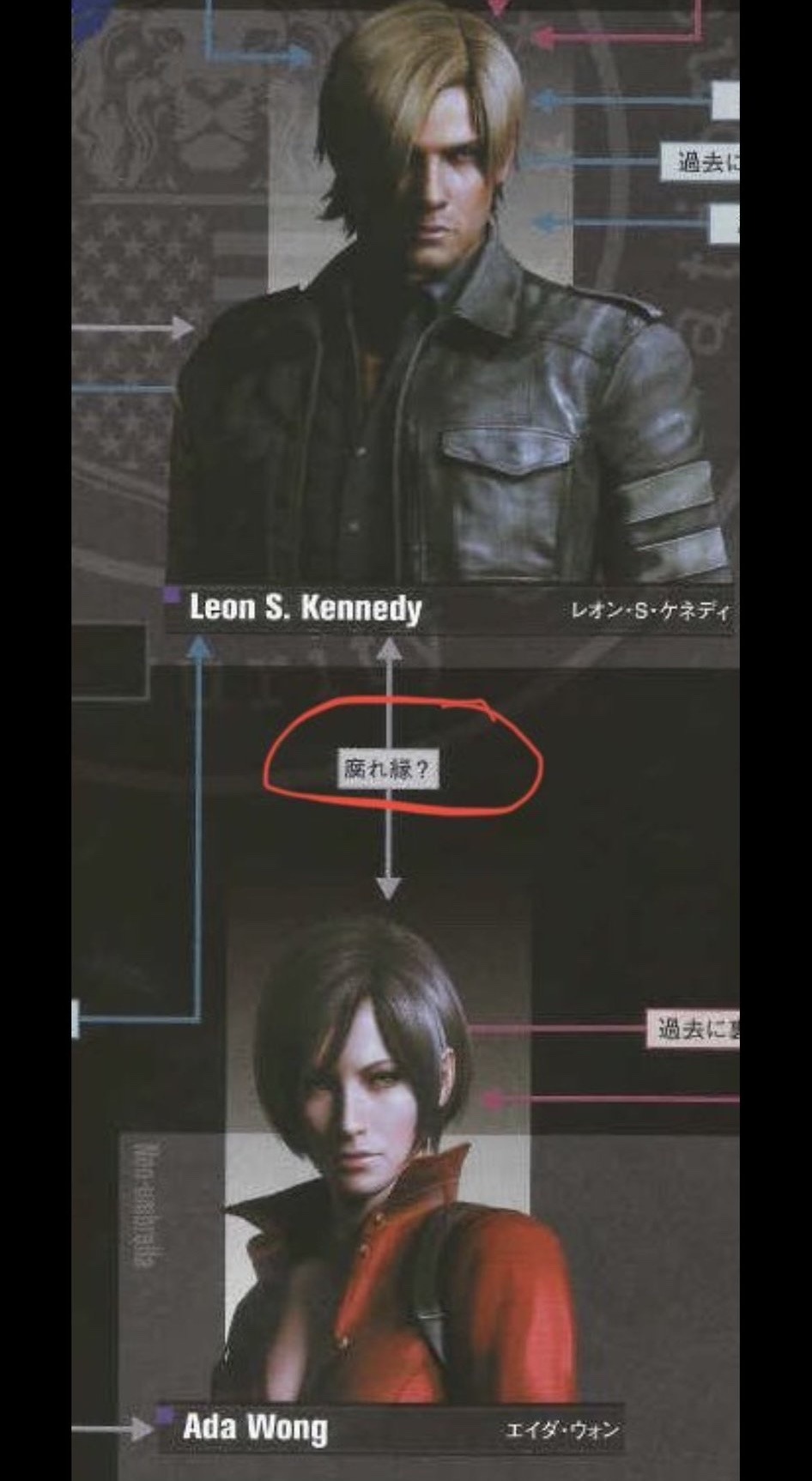
This is the term that others can't seem to grasp well (I mean they kinda do, but they also misinterpret it weirdly). In the English version, their relationship is described as ‘fatal ties’, but I don't care about that - I'm focusing on the Japanese version.
腐れ縁 (くされえん・kusareen) - an undesirable but inseparable relationship.
Kanji breakdown:
腐れ > to rot // 縁 > relations
The highlight of this word is the kanji 腐る, which is a negative verb used to describe something rotting/decaying.
The "inseparable relationship" part may be interpreted as romantic to some; as some shippers say, 'they are fated' (more on that later). But first, we need to understand what 腐れ縁 means in more context. Here are some excerpts I've taken from multiple sources.
離れようとしても離れられない関係 - A relationship that you know you should let go of, but can't. (This is consistent with OG RE4 Leon's line of 'she's a part of me I can't let go'.)
Note: 離れ (はなれ・hanare) mostly means 'to let go (of something/someone)' and 'to separate/to give up/to part ways'.
離れよう、縁を切ろうとしても断ち切れない好ましくない関係 - An unfavorable relationship that you can't cut off no matter how much you try to.
Note: 好ましい (このましい・konomashii) means desirable. 好ましくない (このましくない・konomashikunai) is the negative conjugation of it. 好ましくない関係 - undesirable relationship.
Just from this alone, you can see that their dynamic is difficult to understand. And that's what 腐れ縁 is.
Q. ‘Is the word 'rotten relationship' an accurate translation of the term?’

Google Translate translates this word LITERALLY. I think there is no true English equivalent of 腐れ縁, but yeah, 'fatal ties' is the term closest to it.
Q. ‘Can Leon and Ada be described as 'fated'?’
The answer is yes... and no. Here is another excerpt I find to be interesting:
「運命の相手」 を思わせるようなニュアンス ですが、 実際には好ましくない関係に使われることが 多い言葉です。- The term 腐れ縁 does have a nuance that is reminiscent of "destined/fated partner (or in other words, 'the one')", but in reality, it is often used to refer to undesirable relationships.
Q. ‘So... Is their relationship that bad?'
The answer to this question will depend on your own interpretation of Leon and Ada's dynamic - and that's why people are quite divided when it comes to them. It is said that 腐れ縁 can be positive... in the sense that if you experienced it before, you can now have a better judgment of people (lol). But in some cases, a long-lasting rotting relationship (like theirs) could mean that they at least have some level of mutual trust only they understand. It can work... but even the article I've read wasn't so clear on how it can work, so.

If you made it this far, I hope you found this interesting. :)
#kusare en truly is the perfect term to describe the relationship between these two in my opinion#leon kennedy#leon s kennedy#ada wong#claire redfield#resident evil#adorathoughts#analysis#日本語の勉強
38 notes
·
View notes
Text
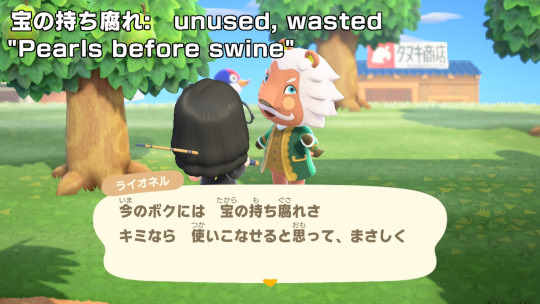
To make studying fun, I often play video games in Japanese. The other day, I found a neat idiom when an NPC gave me a gift.
宝の持ち腐れ:literally, “a treasure rotting in hand” 宝:たから、"treasure" の:here, the possessive marker turns the next verb into a noun 持ち:もち、"have" or "hold" 腐れ:ぐされ、"rot"
It has the same meaning as the English phrase “pearls before swine”. Essentially, it means that something nice / valuable is being wasted on someone who does not appreciate it or use it to full potential.
Putting it all together to translate the text, we get:
今のボクには 宝の持ち腐れさ As for me right now, [it's like] pearls before swine.
キミなら 使いこなせると思って、まさしく。 If it's you, I thought [you'd be] able to make use of [it], indeed.
After saying this, he gave me a rug. Not the treasure I was hoping for!
Corrections always welcome.
#japanese#japanese translation#japanese study#japanese studyblr#japanese studyspo#日本語#日本語の勉強#翻訳練習#studying japanese#japanese learning#japanese langblr#japanese language
47 notes
·
View notes
Text
i love when i go back to a book or comic or drama that used to be too hard and........actually understand it. nothing gives me a better sense of progress or improves my motivation more. a million times better than passing a test for me.
#leveling up on wanikani has NOTHING on comprehending a page of text that doesn't have furigana#langblr#japanese langblr#japanese#日本語の名前#日本語の勉強#llu
78 notes
·
View notes
Text
My dad just gave me the best reason to keep studying japanese.
My second year of uni started, it's getting pretty tough and with my mental and other issues it's been really difficult to even work on my comic, let alone keep studying japanese. Long story short i haven't done a thing to improve my speaking or reading skills in the past two months.
But today my dad was cleaning up his work space/packing up his stuff. He's changing works. He brought home lots of stuff, including this funny looking usb. He gave it to me to check it out. He said he has downloaded a movie on it a long time ago and forgot to give it to me (guess constantly forgetting stuff runs in my family 😅). So today i put the usb in my pc and i found a single movie there: anthem of the heart. I was so happy! Until i played it. Just japanese, no subtitles. And i couldn't understand as much as i thought i would.
So, i'm rolling my sleeves up and logging into my renshuu account, dusting my grammar book that has been successfully collecting dust on my bookshelf, pulling out my study notebook and continuing studying!
And here i thought satoshi kon would keep me going but i already have all his work with subtitles so i guess that wasn't such a strong motivation...but this? Yup, it sure seems like a challenge! Also side eying my no longer human copy written in japanese 👀
30 notes
·
View notes
Text




29th April 2024
Day 27th of 100 Days of Productivity
Things I managed to get done:
vocab of almost all the chapters that are going to be on the test(3 chapters to go)
read the text thoroughly
went for a walk, the weather was lovely today
wrote 200 of the 800 characters required for the essay I need to submit
cleaned out my desk and completely got rid of the clutter (as in threw the stuff I didn't need but kept telling myself I might need it someday kinda cleaning). also watched a few Gilmore Girls episodes while cleaning.
#studyblr#studyspo#new studyblr#study motivation#langblr#study blog#studybuzz#100 days of productivity#bookblr#study community#study inspiration#studying#study aesthetic#日本語の勉強#にほんご#日本語#japanese langblr
63 notes
·
View notes
Text

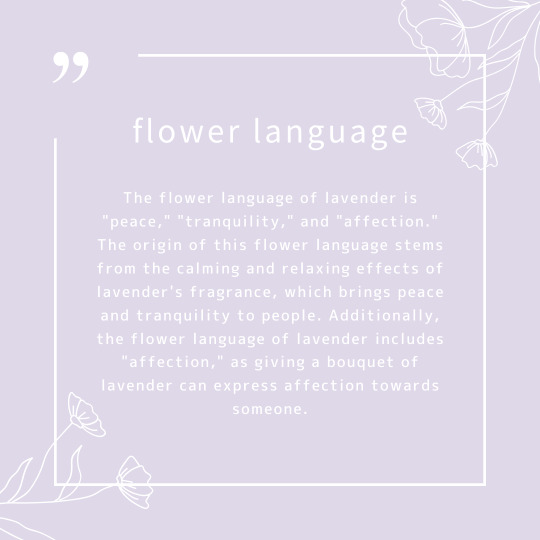
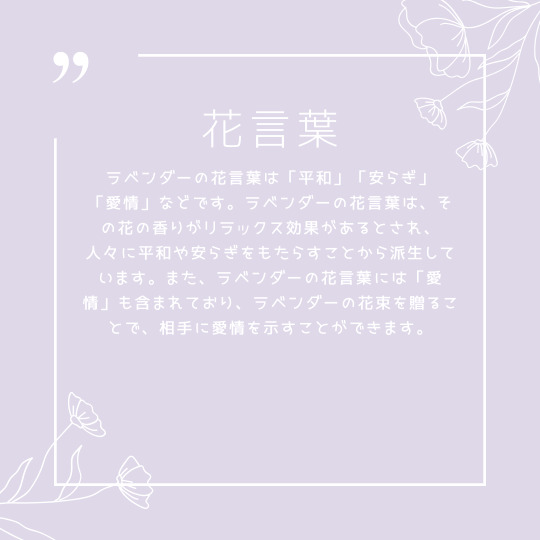
94 notes
·
View notes
Text
オフィスで耳にした単語(1)
名詞 // Nouns
演習(えんしゅう)practice 開発費(かいはつひ)development cost 奇数(きすう)uneven number 後半(こうはん)latter half 借金(しゃっきん)debt, loan 実践(じっせん)practice, implementation 消防設備点検(しょうぼうせつびてんけん)Fire Safety Equipment Inspection 消防(しょうぼう)fire fighting 設備(せつび)equipment 前半(ぜんはん)first half 貸与(たいよ)loan, lending 点検(てんけん)inspection 添付ファイル(てんぷ)attached file 備品(びひん)fixtures, furnishing, equpiment 部署(ぶしょ)department 予算(よさん)budjet
動詞 // Verbs
該当する(がいとう)meet (qualifications), falling under, being applicable ���担する(かたん)assist, participate, support 換算する(かんさん)convert (currency) 記載する(きさい)list, note, record 計算する(けいさん)calculate 実施する(じっし)carry out 借金する(しゃっきん)borrow money 出社する(しゅっしゃ)go to the office 請求する(せいきゅう)demand, charge, bill 使いこなす(つかいこなす)handle, master 投資する(とうし)invest 並び替える(ならびかえる)arrange 配布する(はいふ)distribute 儲ける(もうける)make profit, earn
形容詞 // Adjectives
細かい(こまかい)small 精神的な(せいしんてき)mental, spiritual, moral
その他 // Other
気合が入る(きあい が はいる)be motivated 掲題の件ですが…(けいだい)concerning the matter mentioned before (common expression in business emails) ご一読ください(いちどく)please, read it through 承知いたしました(しょうち)Understood 即座に(そくざ)right there on the spot 即興で(そっきょう)improvised, without any preperation 本日の勤務を終了いたします(ほんじつ は きんむ を しゅうりょう いたします)I am finishing work for today
#オフィスで耳にした単語#語彙リスト#敬語#japanese langblr#langblr#japanese language#language learning#japanese vocabulary#japanese studyblr#japanese#japan#learning japanese#study notes#studying#study movitation#nihongo#日本語#日本語の勉強#working in japan
179 notes
·
View notes
Text
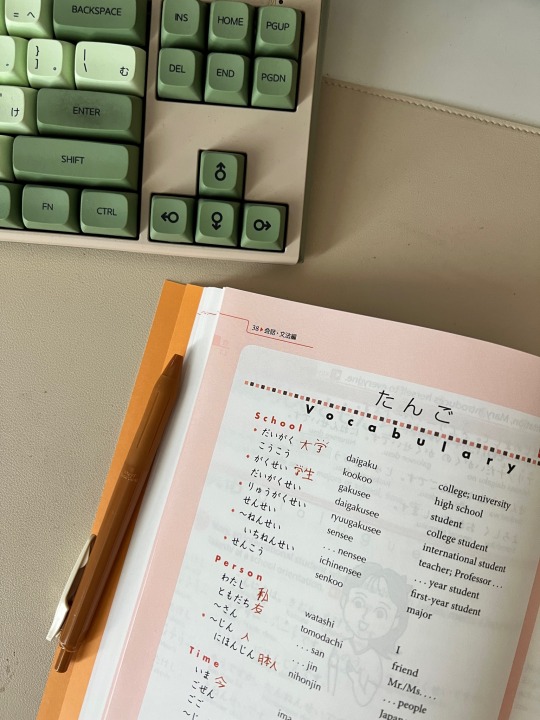
2023/07/21
now that my summer school is over, i’ve got two free days from work, so i’m picking up japanese again! my writing is abhorrent, so, sorry
#lupusmaxima#dark academia#bookblr#chaotic academia#brown#coffee#beige#literature#studyblr#classical literature#japanese#learn japanese#日本語学校#日本語の勉強#genki#langblr#language study#language blog#language learning
359 notes
·
View notes
Text
Hey fellow Japanese langblrs! Any suggestions for YouTubers/bloggers that make videos exclusively in Japanese? I’m not necessarily looking for instruction videos, but something casual I can listen to and get a feel for, preferably daily life vlogs or video essay type videos. If you have any recs pls lmk!
134 notes
·
View notes
Text
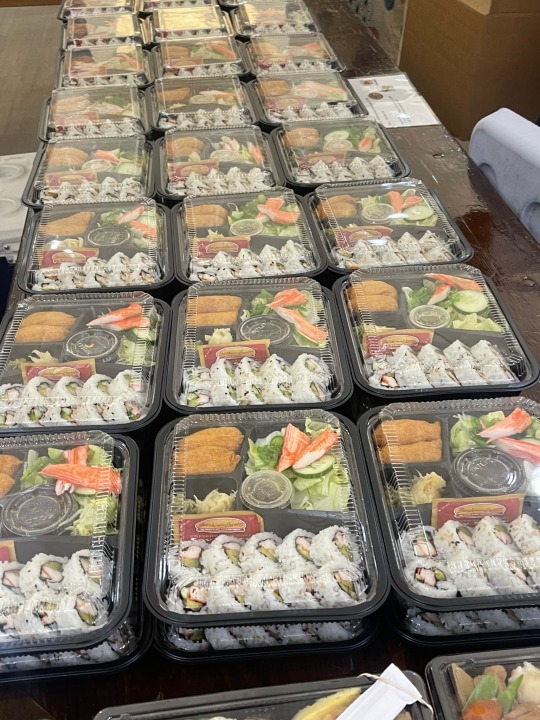
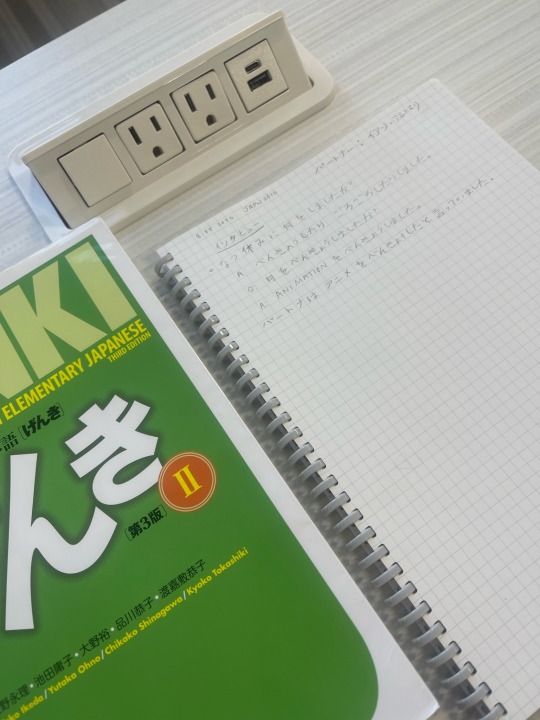




first full week of the semester core ☕️📝
#studyblr#study blog#langblr#langblog#japanese langblr#japanese#japanese language#studyinspo#study motivation#study aesthetic#studyspo#study notes#studystudystudy#study inspiration#studyspiration#university#school aesthetic#schoolblr#日本語の勉強#coffee aesthetic#pinterest aesthetic
185 notes
·
View notes
Text
#learn japanese#japanese study#japanese studyblr#japanese language#japanese langblr#日本語#日本語の勉強#日本語勉強#nihongo#japanese vocabulary#japanese grammar#manga#japanese manga#japanese comic#japanese cartoon#漫画#4コマ漫画#エッセイマンガ#コミックエッセイ#イラストエッセイ#オーストラリア#体重増加#australia#gain weight fast
37 notes
·
View notes
Text
30 day language challenge part 5!
5) お気に入りの季節は何ですか?それはどうしてでしょうか?
What is your favorite season, and why?
秋も冬も大好きだけど、その中で秋が一番大好きだと思います。暑い天気がなかなか嫌いなので、やっと涼しくなると嬉しいです。秋の紅葉は本当に美しくていつも写真をいっぱい撮ります。
その上、秋といえばハロウィンでしょ?楽しい祭りだけど大学生になる以来ハロウィン夜はなにもしないことになりました…ガッカリ…
えーと。とにかく。
秋には、新学期も始まる時なので、わくわくな感じがします。でも、学期の中でさらに遠くに行けば、行くほど忙しく苦しくなるので、楽しいことをする時間が少なくなる。たとえば、友達とスモーキー山脈にハイキング予定があったけど、勉強もバイトもしなきゃいけなかったからできなかった。
時々、秋の現実よりイメージが好きだと思います。ちょっと悲しい。

調べた単語とフレーズ
紅葉 こうよう leaves turning red (in autumn); autumn colors
その上 in addition; furthermore
「x」の中でさらに遠く行く to go deeper into something
スモーキー山脈 さんみゃく Smoky Mountains
イメージ image (in one’s mind); idea (of something)
12 notes
·
View notes